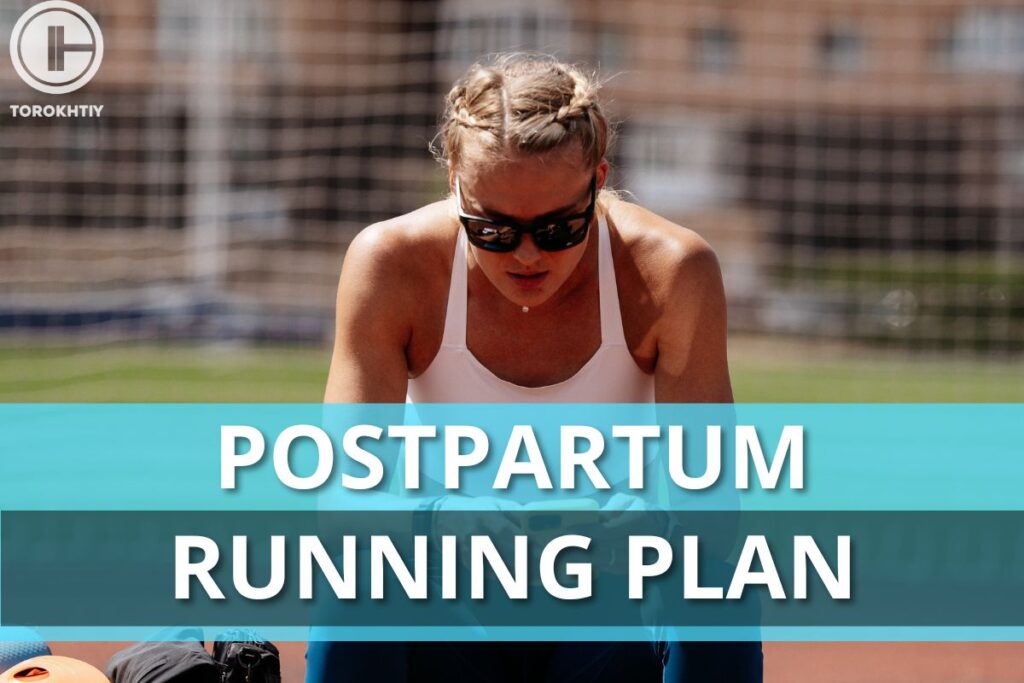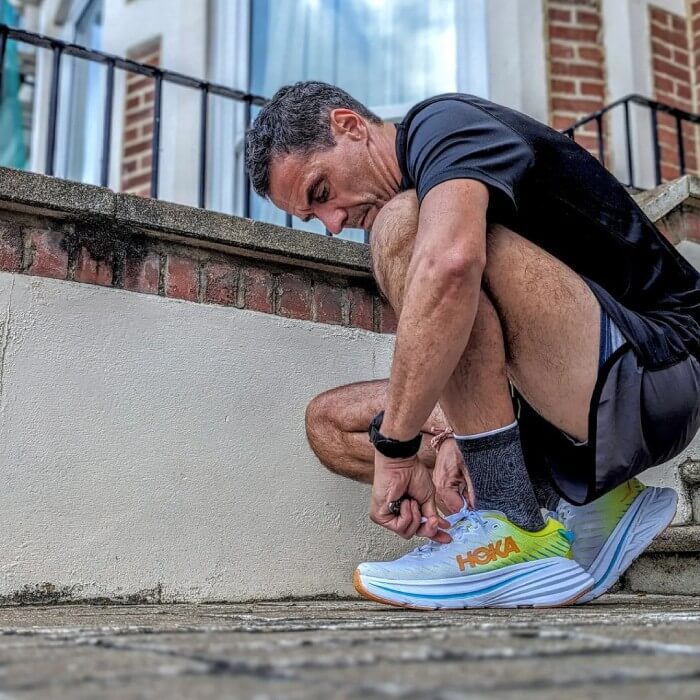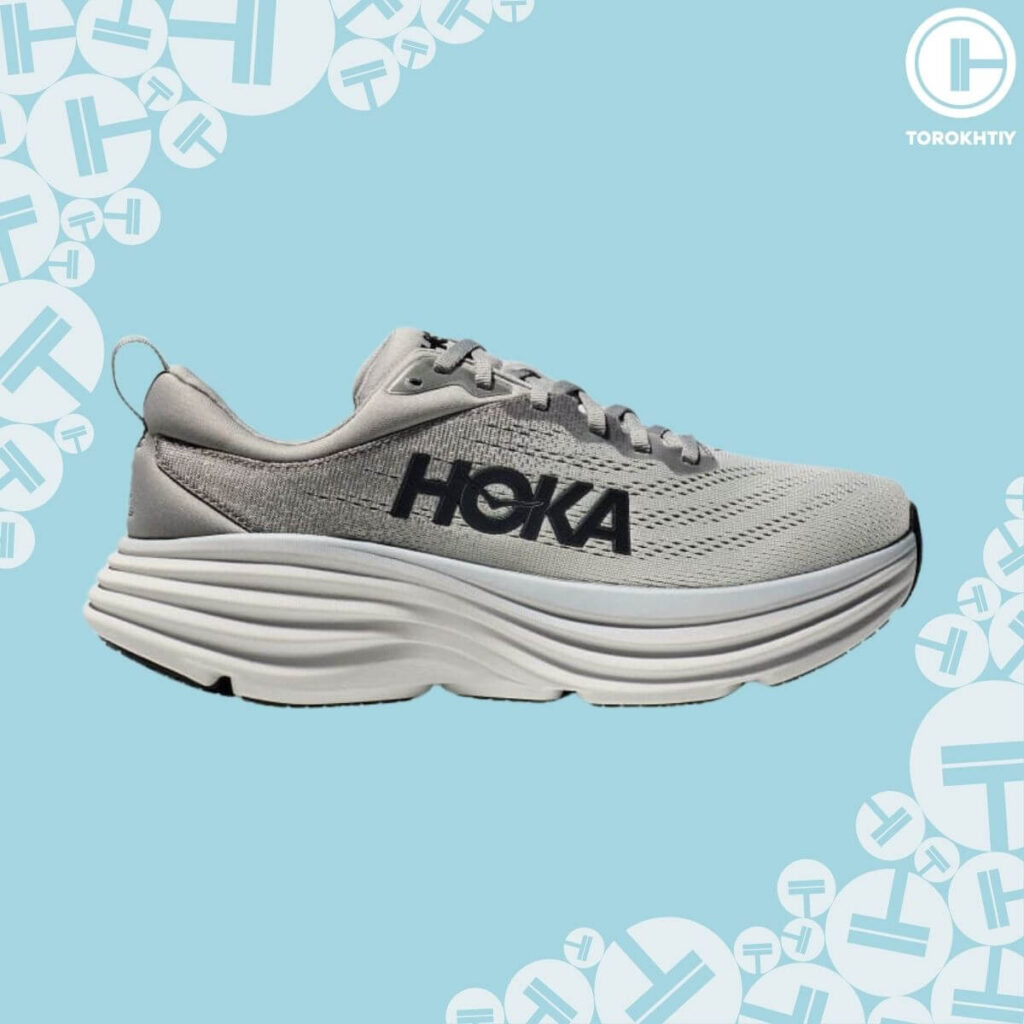The Ultimate Postpartum Running Plan: A Guide for New Moms
Author:
Unlock your full potential by engaging with our experts and community! Have questions about your fitness journey or looking for expert advice on weightlifting techniques? Don’t hesitate — leave a comment below and Viktoriya Tkachuk will provide a personalized answer and insights to help you reach your goals.
Torokhtiy is reader-supported. Some links are affiliate links, and we may earn a commission at no extra cost to you. See our disclosure page for details.
Are you feeling overwhelmed about your return to running after childbirth? Are you looking for an easy postpartum running plan?
It can take months for your body to heal fully and feel ready for exercise at higher levels. But don’t despair! This article provides a comprehensive guide to help new moms safely and effectively navigate the journey back into running.
Whether you’re looking for guidance with regaining strength or motivation during recovery, our blog can point you in the right direction. So don’t wait – jumpstart your postnatal fitness journey today!
When can you start doing postpartum training? – It is important to wait 6-12 weeks postpartum before beginning any sort of strength or cardio training plan. Women who have had a C-section may need to wait longer before running, and should consult with a healthcare professional.

Why Is It Difficult to Run After Giving Birth?
Going through pregnancy and childbirth can take quite a toll on the body, leaving many new moms anxious to return to their pre-pregnancy activities as soon as possible. However, due to the significant physical changes that your body endures, it is incredibly important to be mindful of safety when considering returning to running after giving birth.
During childbirth, your core muscles are stretched significantly. This can weaken them and leave you prone to injury if not taken care of properly. In addition, fluids that accumulate inside your joints during pregnancy can take some time to eliminate.
When Can You Start Running Postpartum?
Can I run 3 weeks postpartum? This is a question many women ask. Generally, women are advised to wait 6-12 weeks after delivery before starting back into a running program. Different types of deliveries have different timelines specific to your situation, so it is best to consult with a healthcare professional who knows your individual history and who can provide guidance that is appropriate and safe for you personally.

When Can You Start Running After a C-Section?
Women who have had a C-section may need to wait longer before running due to the abdominal incision and healing process. It is generally safe to return to running after 16 weeks, but consulting with a healthcare professional is extra important.
Advantages and Disadvantages of Running After Childbirth
There are advantages and risks to running after childbirth that new moms should be aware of before they start up again.
✅ Advantages of Running After Childbirth
Running after giving birth can be incredibly beneficial for new mothers, allowing them to regain their pre-pregnancy fitness levels while also providing a sense of accomplishment. Running helps to improve muscle tone and build strength, which can assist with weight loss and improve aerobic fitness.
Engaging in postpartum exercise has been found to play an important role in improving psychological well-being. It can help reduce anxiety and promote a positive attitude towards life.

❌ Risks of Running After Childbirth
Running after childbirth is a big decision, and one of the potential risks related to postpartum running is pelvic floor dysfunction. Issues such as prolapse or urinary incontinence can occur due to increased strain on this area during running.
Additionally, the supporting muscles may not have recovered yet. This increases the risk of joint pain or injury with running after childbirth. As a result, less stability in movement might also become an issue when running.
Postpartum Running Plan
For new moms who want to ease back into running after giving birth, a postpartum running plan can help them gradually build up their endurance and stamina. Here you can find 4-week training plans for beginners and advanced runners:

4-Week Postpartum Running Plan for Beginners
The 4-week beginner postpartum workout plan for runners is designed to help new moms transition from walking to running safely and gradually.
This plan progresses step by step, based on run/walk intervals,. It starts with low-intensity runs, increasing the distance as progress is made.
| Week | Monday | Tuesday | Wednesday | Thursday | Friday | Saturday | Sunday |
|---|---|---|---|---|---|---|---|
| Week 1 | Rest day | 30-min walk | Rest day | 8-min walk/2-min jog x3 | Yoga or stretching | 6-min walk/4-min jog x3 | Recovery 30-min walk |
| Week 2 | Rest day | 40-min walk | Rest day | 6-min walk/4-min jog x3 | Light core exercises and stretching | 5-min walk/5-min jog x3 | Recovery 40-min walk |
| Week 3 | Rest day | 4-min walk/6-min jog x3 | Rest day | 2-min walk/8-min jog x3 | Yoga or stretching | 2-min walk/8-min jog x4 | Recovery 40-min walk |
| Week 4 | Rest day | 2-min walk/ 10-min jog x3 | Rest day | 2-min walk/10-min jog x4 | Light core exercises and stretching | 2-min walk/15-min jog x2 | Recovery 45-min walk |
This plan ensures ample recovery time, while helping strengthen all supporting muscles, such as pelvic floor muscle. Make sure to have adequate rest before fully returning to pre-pregnancy level of running.
4-Week Postpartum Running Plan for Experienced Runners
Of course, you are still not ready for a postpartum half-marathon training plan. Our 4-week running plan is designed to help new moms make a safe, gradual transition from walking to running. Aimed at experienced runners who have recently given birth, the program focuses on re-strengthening the pelvic floor and core muscles, which can often be weakened during pregnancy and childbirth.
Through the use of run/walk intervals, this postpartum plan gradually works up to longer runs, with no more than 25 minutes at its longest interval.
| Week | Monday | Tuesday | Wednesday | Thursday | Friday | Saturday | Sunday |
|---|---|---|---|---|---|---|---|
| Week 1 | Rest day | 5-min walk/5-min jog x3 | Yoga or stretching | 4-min walk/6-min jog x3 | Rest day | 5-min walk/5-min jog x4 | Recovery walk 40-min |
| Week 2 | Rest day | 3-min walk/7-min jog x3 | Light core exercises and stretching | 2-min walk/8-min jog x3 | Rest day | 10-min walk/10 min jog/ 10-min walk | Easy jog 15 min + 20 min walking |
| Week 3 | Rest day | 2-min walk/10-min jog x3 | Yoga or stretching | 2-min walk/15-min jog x3 | Rest day | Recovery walk 40-min | Easy jog 20 min + 20 min walking |
| Week 4 | Rest day | 2-min walk/15-min jog x3 | Light core exercises and stretching | 2-min walk/20-min jog x2 | Rest day | Recovery walk 45-min | Easy run 25 min + 20 min walking |
It is highly recommended that new mothers start running at least 6 weeks postpartum in order to ensure a safe return to activity, while providing their bodies adequate time for healing and recovery.
3 Helpful Tips for Running After Giving Birth
Here are 3 easy tips to help your body adjust more smoothly:
1. Wait Until You’re Ready
It is important for new moms to wait until they’re ready before starting running after giving birth, as this can help protect them from physical and emotional harm. Running after pregnancy isn’t something that should be rushed.
A few extra weeks of preparation are generally recommended for the best outcome. Take your training slowly so you can gradually strengthen your body without putting yourself at risk of serious fatigue or injury.
Tips From the Champ
Start by going for short walks, adding 20-30 minutes of light aerobic activity like jogging or running each week until you feel stronger. Gradually increase distance over time. Add core strengthening exercises for core stability, posture alignment, and abdominal strength.
Ukrainian Professional Athlete
2. Listen to Your Body
A common mistake new moms make is pushing themselves too hard and too fast as they try to regain their pre-pregnancy fitness levels. It’s okay (and recommended) not to rush. Prioritize self-care and pay attention if you experience any pain or discomfort during postpartum running sessions.
Tips From the Champ
You may have difficulty walking up steps or find yourself out of breath after light activity, like carrying your baby. These can be signs that running might still be challenging for you.
Ukrainian Professional Athlete
3. Make Time for Rest
Taking the time to make rest and recovery part of your regular workout routine helps you stay injury-free, boosts energy levels, and reduces excess strain on the body.
Tips From the Champ
It’s important for runners who have recently given birth to allow themselves ample time between each session in order to restore energy levels, as well as to promote correct muscle repair.
Ukrainian Professional Athlete
By making rest an integral part of your returning-to-running postpartum plan, you will be able to gradually build up strength without overexerting yourself.
Hoka Bondi 8
- Material: Breathable and supportive mesh upper
- Sole Material: Full-length EVA midsole for maximum cushioning
- Outsole (tread feature): Durable rubber outsole with a unique lug pattern
- Drop: 4mm
- Season: Suitable for all seasons
- Special Features: Exceptional cushioning and comfort
- Size: Available in various sizes
- Type: Maximum cushioning running shoe
If you want excellent running or walking shoes or just footwear you’ll be comfortable in, you can’t go wrong with the Hoka Bondi 8.
It’s been upgraded and now they have lighter, softer materials and a new extended heel design. The heel design gives a super soft, balanced feeling from th emoment your heel hits the ground to when you push off with your toes.
As far as the weight goes, it’s around 10.80 ounces, and the heel drop is 4 mm. They’re not too heavy and the lower drop is a good balance between cushioning and feeling connected to the ground.
The Bondi 8 is focused on cushioning and keeps things simple. There’s a good amount of support without any extra stuff that you don’t really need and that would only jack up the price. Take the rear crash pad, for example – it makes for a soft, smooth ride, which is perfect if you like to run outdoors.

The upper part is made of engineered mesh, which is breathable and keeps your feet cool and dry. The tongue and collar have memory foam and mold to your foot shape. All of these features make the fit snug but flexible, which is exactly what you would want.
The Bondi 8 is eco-friendly because it uses recyclable materials in parts like the mesh and the sockliner. Plus, the shoes are completely vegan, which (if that’s important to you) is nice!
FAQ
How Do I Prepare for Postpartum Running?
Preparing for postpartum running includes engaging in an active recovery program that focuses on strengthening the pelvic floor and supporting muscles. This helps to build up your strength and increase flexibility.
Is the Couch-to-5k Program Good for Postpartum?
While the program offers benefits for beginner runners, postpartum couch-to-5k may not be appropriate for some postpartum women. For those with physical limitations or underlying medical conditions, tackling an intense training plan too quickly could put them at risk of injury or excessive fatigue.
Is It OK to Run 4 Weeks After Giving Birth?
While some women may feel ready to resume running after only 4 weeks of postpartum recovery, it is important to consider the risks. To start running after childbirth, it’s usually recommended to wait 6-12 weeks before running. Women who have had a C-section should wait longer (at least 12-16 weeks).
Conclusion
When returning to running after pregnancy, it is crucial to take your time and ease into the process with a gradual increase in mileage. Our free postpartum workout plan offers new moms everything they need to know about how to safely return to running after childbirth.
Our 4-week plans for postnatal women and evidence-based advice from experts offer an effective approach that encourages everyone to listen to their bodies and be patient.
Have you already started running after pregnancy? Please share your experience with us in the comments below.
References:
- Evenson KR, et al. Summary of international guidelines for physical activity after pregnancy. Obstet Gynecol Surv. 2014 Jul;69(7):407-14. https://www.ncbi.nlm.nih.gov/pmc/articles/PMC4134098/
- Selman R, et al. Maximizing Recovery in the Postpartum Period: A Timeline for Rehabilitation from Pregnancy through Return to Sport. Int J Sports Phys Ther. 2022 Oct 1;17(6):1170-1183. https://ijspt.scholasticahq.com/article/37863-maximizing-recovery-in-the-postpartum-period-a-timeline-for-rehabilitation-from-pregnancy-through-return-to-sport
- Returning to running after childbirth. Royal Berkshire NHS Foundation Trust https://www.royalberkshire.nhs.uk/media/n0efeps4/physio-return-to-running-after-childbirth_dec22.pdf
- Blyholder L, et al. Exercise Behaviors and Health Conditions of Runners After Childbirth. Sports Health. 2017 Jan/Feb;9(1):45-51. https://www.ncbi.nlm.nih.gov/pmc/articles/PMC5315256/
- Christopher SM, et al. What are the biopsychosocial risk factors associated with pain in postpartum runners? Development of a clinical decision tool. PLoS One. 2021 Aug 12;16(8):e0255383. https://journals.plos.org/plosone/article?id=10.1371/journal.pone.0255383
- Photos by Torokhtiy Media Team; Matthew Edington, Pexels.
Why Trust Us?
With over 20 years in Olympic weightlifting, strength training, nutrition coaching, and general fitness our team does its best to provide the audience with ultimate support and meet the needs and requirements of advanced athletes and professional lifters, as well as people who strive to open new opportunities and develop their physical capabilities with us.
By trusting the recommendations of our certified experts in coaching, nutrition, and sports training programming, as well as scientific consultants, and physiotherapists, we provide you with thorough, well-considered, and scientifically proven content. All the information given in the articles concerning workout programming, separate exercises, and athletic performance, in general, is based on verified data.
The product testing process is described in more detail here.
Author: Viktoriya Tkachuk
Ukrainian Professional Athlete
Best Results:
400 metres hurdles is 53.76 seconds
2nd place in European Championships in 2022
Ukrainian athlete specialising in the 400 metres hurdles. She won the silver medal in the event at the 2022 European Athletics Championships.
Tkachuk represented Ukraine at the 2016 Rio Olympics without advancing from the semi-finals, and at the 2020 Tokyo Olympics, where she placed sixth in the final.





Still have questions after reading our article? Unlock your full potential by engaging with our experts and community! Don’t hesitate — leave a comment below and Viktoriya Tkachuk will provide a personalized answer and insights to help you reach your goals.